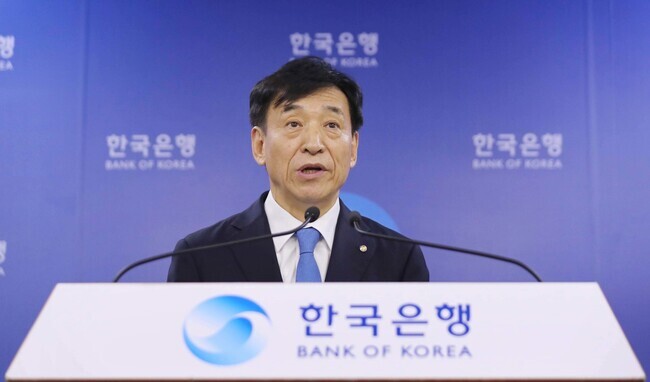hankyoreh
Links to other country sites 다른 나라 사이트 링크
BOK governor says IMF projection of negative growth is “excessive”

Bank of Korea (BOK) Governor Lee Ju-yeol has described the International Monetary Fund (IMF)’s downward adjustment in Korea’s potential growth rate as “excessive.” During a press gathering for “looking at the status of price stability targets” on June 25, Lee stated, “As the IMF lowers its growth forecast for the global economy, I can’t help but feel that they have slightly overstated the level of impact on Korea.” Lee added, “I do not believe conditions have changed over the past month to the extent that the [-0.2%] adjustment in the projected growth rate for the Korean economy is justified.”
On June 24, the World Economic Outlook Update released by the IMF adjusted its forecast of Korea’s 2020 growth rate to 2.1%, a reduction of 0.9 percentage points over April. Due to the repercussions of the COVID-19 pandemic, the global growth rate forecast was lowered to -4.9%, a reduction of 1.9 percentage points.
The economic forecast released by the BOK on May 28 was based on the scenario where the number of global confirmed cases reaches a peak in the second quarter and then begins to stabilize, leading to a gradual resumption of economic activity. “Although it currently appears that COVID-19 may take a bit longer to subside, we are seeing a sequential resumption of economic activity, so this is not a great deviation from the BOK’s assumed scenario,” Lee stated.
Lee predicted that the trend of low inflation would persist for some time even after the virus has been subdued due to an increase in highly risk-averse “super savers.” “After a massive pandemic or economic crisis, households and businesses tend to reduce debt and increase savings due to anxiety,” Lee said. “This hinders the recovery in consumption and investment, and has the potential to slightly lower consumer prices.” The rapid adoption of non-face-to-face online transactions in response to COVID-19 may place additional downward pressure on inflation. In May, the inflation rate was -0.3%. “We will maintain the basic framework of the current inflation targeting system while seeking an alternative monetary policy system to overcome its limitations,” Lee added.
By Han Gwang-deok, finance correspondent
Please direct comments or questions to [english@hani.co.kr]

Editorial・opinion
![[Editorial] Yoon must halt procurement of SM-3 interceptor missiles [Editorial] Yoon must halt procurement of SM-3 interceptor missiles](https://flexible.img.hani.co.kr/flexible/normal/500/300/imgdb/child/2024/0501/17145495551605_1717145495195344.jpg) [Editorial] Yoon must halt procurement of SM-3 interceptor missiles
[Editorial] Yoon must halt procurement of SM-3 interceptor missiles![[Guest essay] Maybe Korea’s rapid population decline is an opportunity, not a crisis [Guest essay] Maybe Korea’s rapid population decline is an opportunity, not a crisis](https://flexible.img.hani.co.kr/flexible/normal/500/300/imgdb/original/2024/0430/9417144634983596.jpg) [Guest essay] Maybe Korea’s rapid population decline is an opportunity, not a crisis
[Guest essay] Maybe Korea’s rapid population decline is an opportunity, not a crisis- [Column] Can Yoon steer diplomacy with Russia, China back on track?
- [Column] Season 2 of special prosecutor probe may be coming to Korea soon
- [Column] Park Geun-hye déjà vu in Yoon Suk-yeol
- [Editorial] New weight of N. Korea’s nuclear threats makes dialogue all the more urgent
- [Guest essay] The real reason Korea’s new right wants to dub Rhee a founding father
- [Column] ‘Choson’: Is it time we start referring to N. Korea in its own terms?
- [Editorial] Japan’s rewriting of history with Korea has gone too far
- [Column] The president’s questionable capacity for dialogue
Most viewed articles
- 1Months and months of overdue wages are pushing migrant workers in Korea into debt
- 2Trump asks why US would defend Korea, hints at hiking Seoul’s defense cost burden
- 3At heart of West’s handwringing over Chinese ‘overcapacity,’ a battle to lead key future industries
- 4[Editorial] Yoon must halt procurement of SM-3 interceptor missiles
- 5Fruitless Yoon-Lee summit inflames partisan tensions in Korea
- 61 in 3 S. Korean security experts support nuclear armament, CSIS finds
- 7Dermatology, plastic surgery drove record medical tourism to Korea in 2023
- 8AI is catching up with humans at a ‘shocking’ rate
- 9First meeting between Yoon, Lee in 2 years ends without compromise or agreement
- 10Amnesty notes ‘erosion’ of freedom of expression in Korea in annual human rights report